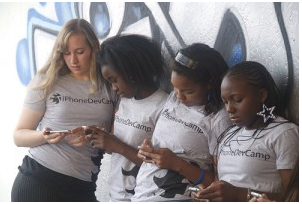By B.L. Ochman
 Millenials, the generation of 80 million people born between 1984 and 2003, spend $43 billion annually, and collectively are redefining America’s cultural landscape and its economy. Kid culture – replete with cell phones, laptops, iPods and iPads – is having a direct impact on how Americans live, work and play. Learn what they want and give it to them, or else, says Tina Wells, CEO of Buzz Marketing Group.
Millenials, the generation of 80 million people born between 1984 and 2003, spend $43 billion annually, and collectively are redefining America’s cultural landscape and its economy. Kid culture – replete with cell phones, laptops, iPods and iPads – is having a direct impact on how Americans live, work and play. Learn what they want and give it to them, or else, says Tina Wells, CEO of Buzz Marketing Group.
To prosper, businesses need to understand millenials’ interconnected, wired world, as well as their values, likes and dislikes. We interviewed Wells to get her insights on how brands can tap into the power of the most connected and tech-savvy generation ever.
B.L. Ochman: Tweens spend $43 billion annually, which translates to about $2,047 per tween (Source: Research and Markets) Where do they get that money?
Tina Wells: That’s a complicated answer depending on who you’re talking to. For tweens, it’s coming from their parents and grandparents, primarily. On average, it’s about $11 per week. For teens, it’s a combination of gifts, parents, grandparents, and a part-time job. For young adults, it’s normally from parents , a part-time job, or full-time job.
 B.L. Ochman: What are the top tween trends you see for 2012?
B.L. Ochman: What are the top tween trends you see for 2012?
Tina Wells: When it comes to tweens, the trends are pretty predictable. This is basically the stage of life where they’re discovering who they are and what they like. Celebrities and role models are really important to them, so celebs like Miranda Cosgrove and Selena Gomez heavily influence tween girls. For boys, athletes like LeBron James and musicians like Justin Timberlake have a lot of influence. An overall trend is really fast fashion and value.
Luxury labels matter, but technology is the new fashion
B.L. Ochman What do millenials buy and why?
Tina Wells: Technology, fast fashion, and luxury. Even though many millennials can’t afford pricey Macbooks, they love their iPod Touches and iPods. Other gadgets like smartphones are also important. Technology is the new fashion.
They do still care about their appearance, which is why retailers like Forever 21, Justice, Target, and American Eagle Outfitters are so important. All of these retailers stock relatively inexpensive goods that turn over on almost a weekly basis.
Brands like Dooney & Burke, Coach, and even Louis Vuitton are also doing well with younger consumers. They prefer to save money for a lower priced item from these brands and just spend less on other things.
Status is still incredibly important. You also see these luxury retailers reaching out to the younger market. Coach launched it’s lower priced line, Poppy, a few years ago.
B.L. Ochman: What brands are the biggest among girls? Boys?
Tina Wells: Target, Old Navy, Nintendo, Coach, Apple, American Eagle Outfitters rank high for girls and boys in all categories.
Games rule teen online time
B.L. Ochman: Millenial Media says games are still millenials’ dominant device usage with, you guessed it, social networking applications following in at second place. Are they using their social networks to shop?
Tina Wells: First, they’re using apps like Foursquare to see if a certain place is a hot spot. For example, are there tons of people at the local mall right now?
Next, they’re using online coupons and secret codes for retail promotions.
Finally, they’re creating content to showcase their purchases. It’s about having a fantastic shopping experience even before they reach the store.
B.L. Ochman: According to your research, young people in droves are using the Internet for shopping: a whopping 84% of respondents in your survey claim to shop online regularly. Your research shows that 99% of millenials have a Facebook page! And your annual Teen Study showed that 61% of teens hear about new products online, while 15% still hear about them from friends)
Given all the time they spend online and in social networks, how important is social shopping to teens?
Tina Wells: I think that social shopping will be more important in a few years. Right now, Facebook is the hub, and 99% of Millenials have a Facebook page according to our research.
Tweens love fashion and style, so sites like Stardoll are important in this space.
But older girls are on sites like Teenvogue, which has really established itself as a style authority for Millennial girls. I don’t see a lot of shopping sites for male Millennials, but there might be a trickle down effect from what magazines like Details, Esquire, and GQ are doing.
B.L. Ochman: How has the economy changed the way millenials shop? After all, millenials, like the rest of Americans, have high unemployment rates. Many young college grads haven’t been able to find jobs, have huge college loans to pay off and not often looking for help of an adviser, If you need one might want to read more, and are still living at home.
Tina Wells: Perceived value is most important. And sites like LivingSocial and Groupon have completely changed the shopping experience.
Now groups of friends buy specials together and decide on experiences based on value. The noon lunch hour is owned by Gilt Group. Older Millennials are able to get great designer pieces for a fraction of the cost. I don’t know how we’ll ever get consumers to go back to paying full price!
Hesitant commitment to jobs and relationships
B.L. Ochman: How will millenials shape the future? Will they marry later? Live at home for many years?
Tina Wells: First, let’s talk about their work life. They will not be committed to the idea of working for one company for 20 years, then reaping the benefits of pensions, retirement, etc.
They’ve watched their parents invest in those types of careers, and have seen the consequences over the last few years. There is no such thing as a safe job, and they know it. They’re going to work how they want, where they want, with whom they want.
Their personal lives will also be more evolved. They will marry later – if at all. At least half of all Millennials are products of broken marriages or relationships. The idea of traditional marriage is being challenged by what appears to be cooler, hipper couplings a la Brad Pitt and Angelina Jolie.
Family is still very important, but the idea of what a family truly is has changed a lot.
They’re incredibly informed on current events and politics, and want to see more unity. They’re not into the polarizing politics of today. So news will definitely have to change its tune in the future to appeal to Millennials.
And let’s talk about entertainment. Yes, they love their laptops and online content, but books and TV are still very important to them. What matters most is good content; I like to say that they’re platform agnostic.
Wells is author of “Chasing Youth Culture and Getting it Right.







